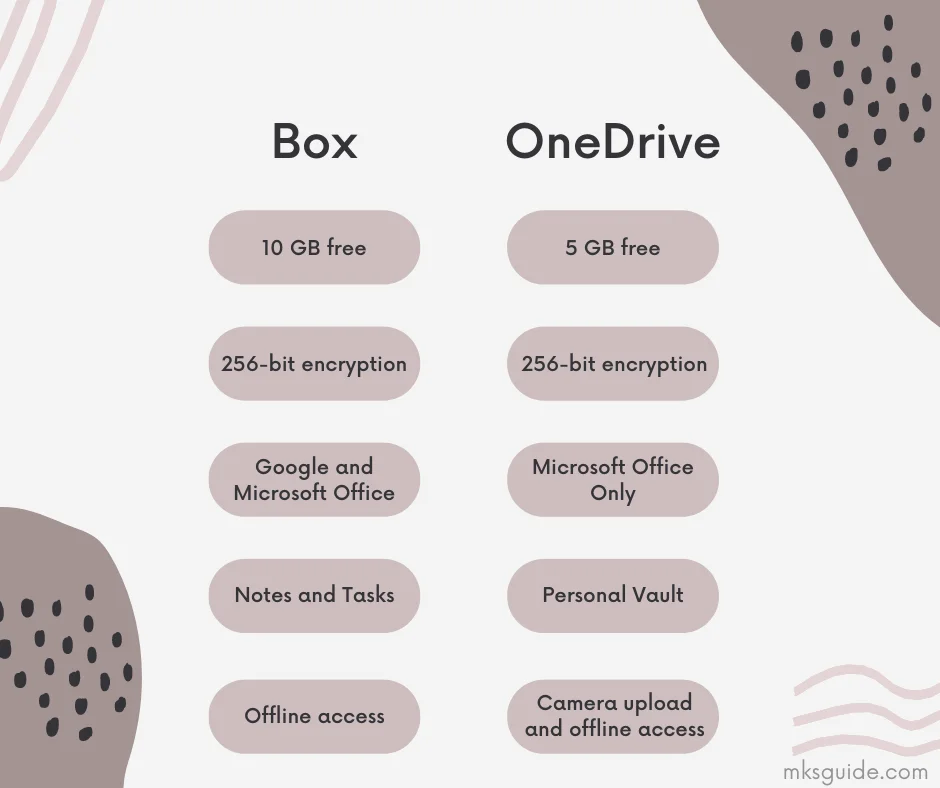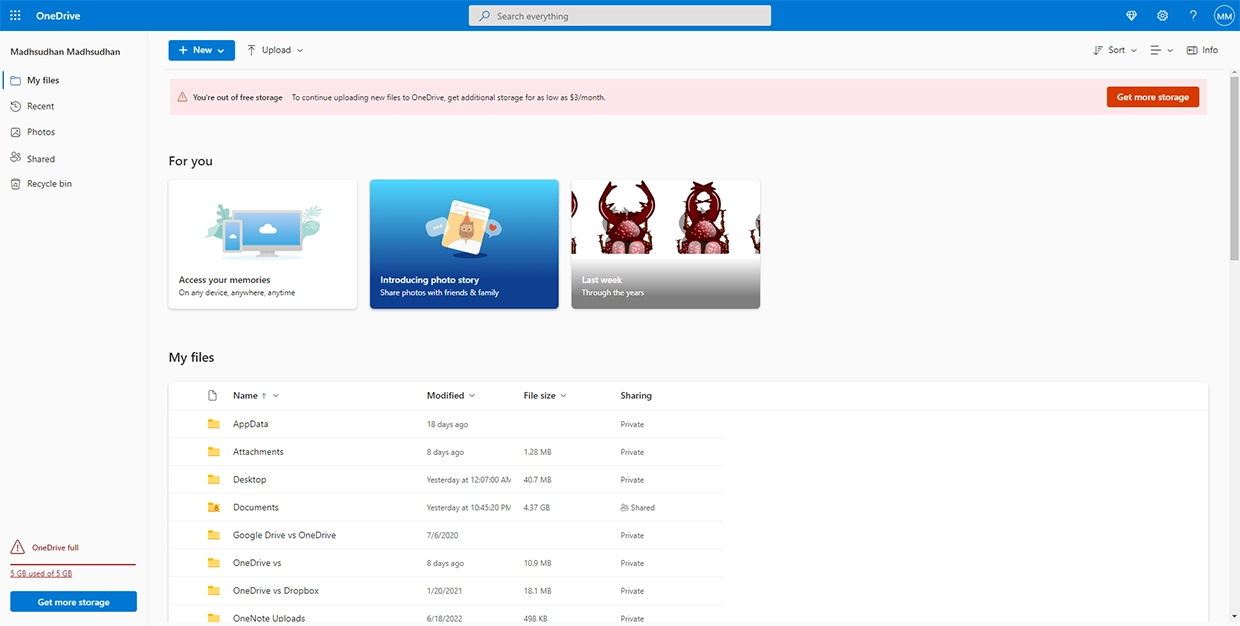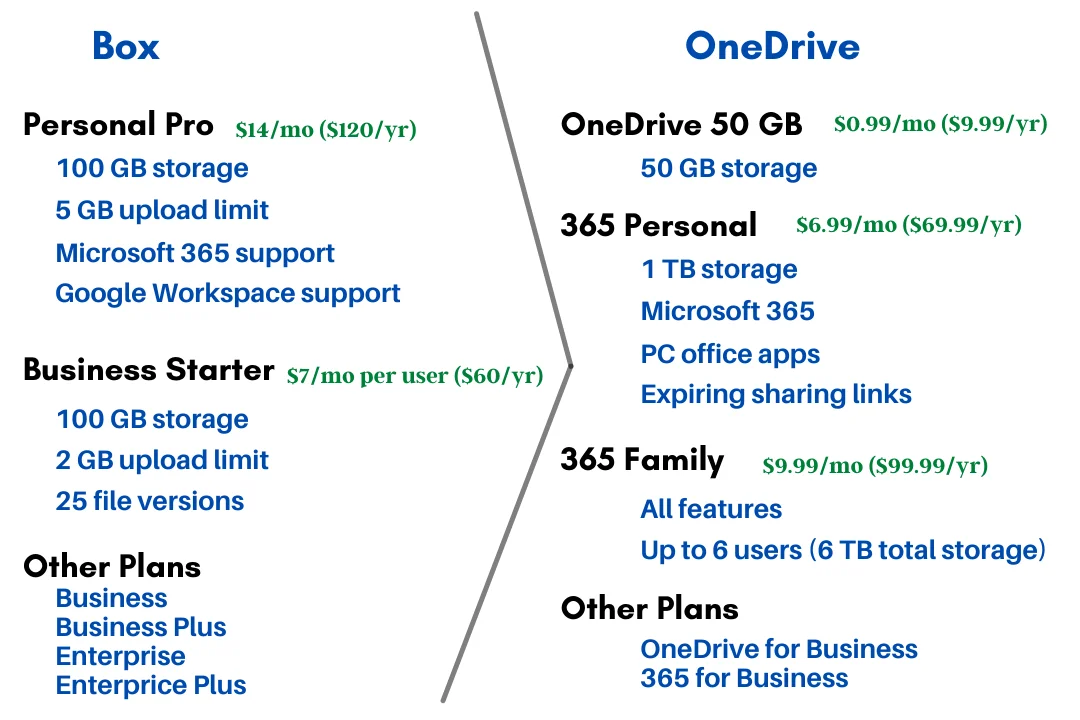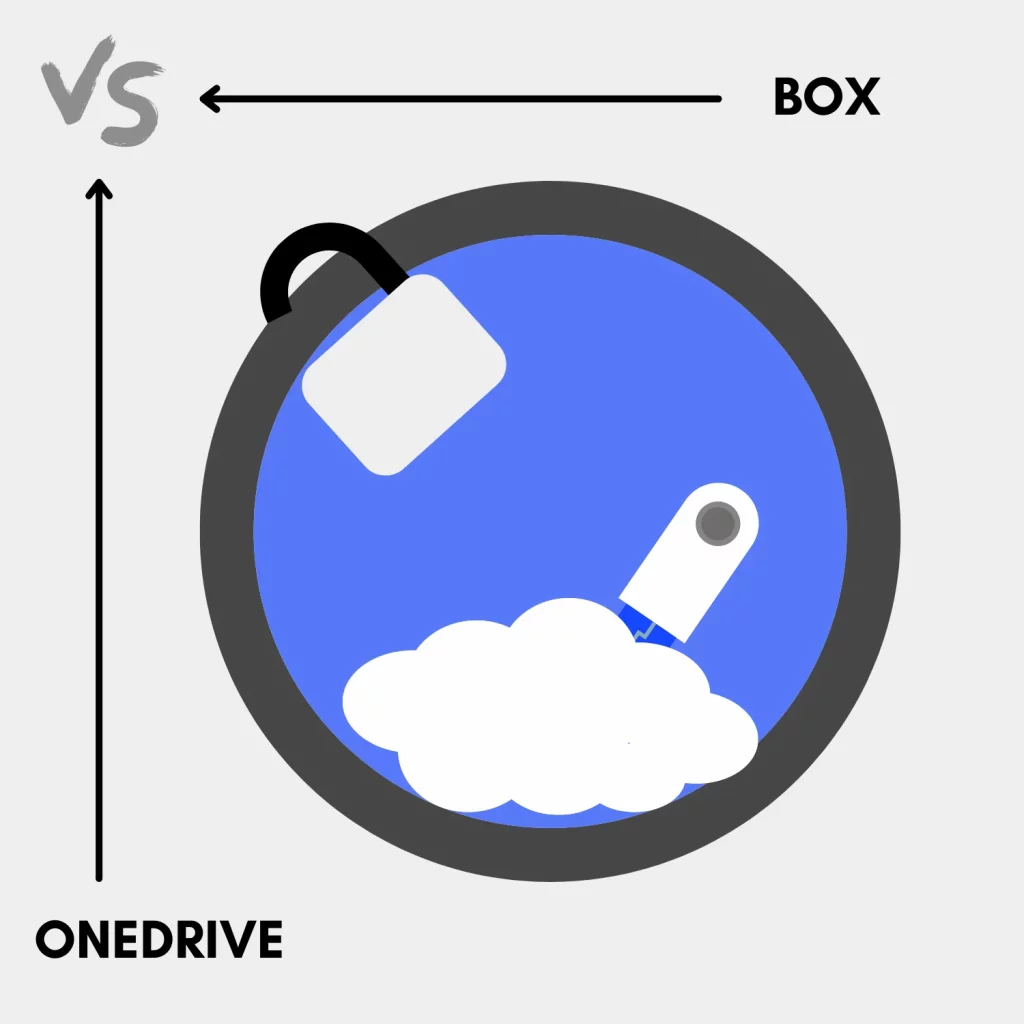Two popular cloud storage and sharing apps are Box and Microsoft OneDrive. With advanced sharing and security features, the Box vs. Microsoft OneDrive comparison is inevitable.
Which is better

Box brings the features of both Google Drive and OneDrive. Plus, built-in tasks and notes make it the ultimate cloud storage platform.
OneDrive is only integrated with Microsoft tools and may help those using Microsoft products.
Platforms

You can download Box on Windows PC, macOS, Android, and iOS devices. The online version is also accessible on popular browsers.
Like Box, OneDrive is available on all mentioned OS. It’s also available on Xbox One and Windows Phone devices.
Both create a new folder in the navigation pane on Windows PC and Mac devices to efficiently access and share files without going to the websites.
Storage
While comparing Box vs. OneDrive, I realized Box offers double the free storage. It brings 10 GB compared to 5 GB of OneDrive.
Winner: Box.
Supported files
Both support uploading, downloading, and opening common files. Box supports standard image formats and some vector files.
OneDrive can open image files but does not support many vector files. Both also do not open RAW image formats.
Regarding video files, both support ordinary ones. You can’t open MKV files in either. However, documents, including DOCX, PDF, etc., can be opened.
Creating a document in Box is quicker as it supports both Microsoft and Google apps.
You can go to the upload section and create a new Word, PowerPoint, or Excel file. The tool is also integrated with Google Workspace (Docs, Slides, and Sheets), which is missing in the opponent.
Winner: Box.
Related: Sync.com vs. Microsoft OneDrive
Box vs. OneDrive: Sharing
The common sharing options are found in both. I tested many files and found that in the free plan, both offer similar features. You can:
- Send links to emails
- Set link permissions (edit and view)
- Create a public link with link permissions
OneDrive comes with an additional message box to add text for the receiver.
Winner: Tie.
Security
Both claim to have robust security protocols to protect your files. Box has enterprise-grade servers that are monitored daily. The program uses 256-bit AES encryption.
OneDrive uses a “zero-standing access” system to protect your data. It also uses 256-bit encryption.
Also, each file is scanned before being saved on the server. The physical servers are also isolated, and only a few personnel can access them.
Winner: Tie, but OneDrive has a few more security features.
Trash
The deleted files are kept in both for 30 days by default. On business plans in both, admins have the option to extend this period.
OneDrive’s recycling bin size is 5% of the total, whereas Box does not mention the total size, so I understand there is no limit.
Also, Box comes with a filter to only search in the trash folder, while this option is missing in OneDrive.
Winner: Tie.
Related: Google Drive vs. Photos vs. One
Additional options
Box
Notes: You can create and save notes. The feature, along with rich text editing, comes with templates.
Tasks: You can create tasks to manage your work. The tasks option is not advanced but good enough to do simple work.
No limit on sharing: OneDrive limits sharing of files on its free plan. Box does not limit on sharing of files.
Shared icon: The drive shows a shared icon to help you see all the shared files.
Offline files: You can access files offline on desktop and mobile devices.
OneDrive
Personal vault: It’s a folder to password-protect your files. The free plan only supports a maximum of three files.
Photos section: You can see and view all drive photos in one location.
Auto camera upload: You can enable the camera upload on your phone to save media online automatically.
Memories: It’s not the best, but the mobile app sends push notifications for old media.
Offline access: Like Box, access files offline on desktop computers and mobile phones.
New file icon: You see a small icon on the top of the file icon of newly uploaded files.
Integrations
Box has over 1500 integrations. From email services like Gmail and Outlook to management apps like Slack and Zoom, you find integrations for many services.
OneDrive also supports plugins. The app is already integrated with Office web apps, but you will find the following:
- Zoom
- Zapier
- DocuSign
- AppSheet
Pricing and plans

The free plan of Box has the following:
- 10 GB of cloud storage
- 250 MB upload limit
- One file version
- 2-factor security
Box only comes with one individual plan Personal Pro, which costs $14 per month ($10 yearly). The plan comes with the following:
- 100 GB storage
- 5 GB file upload limit
- Ten file versions
- Advanced link permissions and link expirations
The Business plan, which is for teams, costs $7 per month per user ($5 yearly) for at least three users. It has the same options as the personal pro, except you get a 2 GB file upload limit.
Besides those two, they offer business, business plus, enterprise, and enterprise plus subscriptions.
OneDrive contrarily has a standalone plan titled OneDrive 50 GB, which, as the name suggests, offers 50 GB storage. It costs $0.99 per month or $9.99 per year.
The Personal Microsoft 365 plan offers OneDrive 1 TB storage and Office apps for PC. You pay $6.99 per month or $69.99 per year to subscribe. The plan has some additional options like:
- Expiring shared links
- Unlimited personal vault (up to your storage)
- Password-protected sharing
- Increased sharing limit
The Family plan of 365 has the same features supporting six independent computers. The plan costs $9.99 per month or $99.99 per year.
Which is for you
I suggest going with Box. Both apps have almost the same options. Box gives you twice the size.
However, if you use Microsoft apps on your PC and phone, you will benefit more from OneDrive. It is integrated with Windows and has apps for every job.
Box vs. Microsoft OneDrive: Links
In conclusion
Box vs. OneDrive covered many essential factors. I hope it helped you select the best tool. Please take a moment to share your thoughts below and help others decide.
Madhsudhan Khemchandani has a bachelor’s degree in Software Engineering (Honours). He has been writing articles on apps and software for over five years. He has also made over 200 videos on his YouTube channel. Read more about him on the about page.
